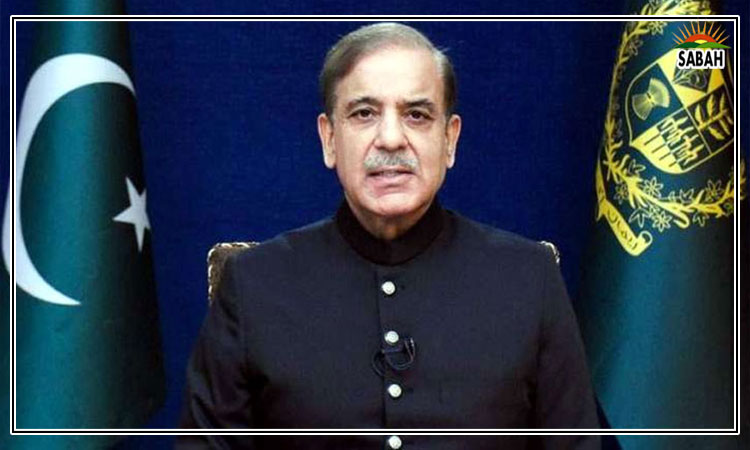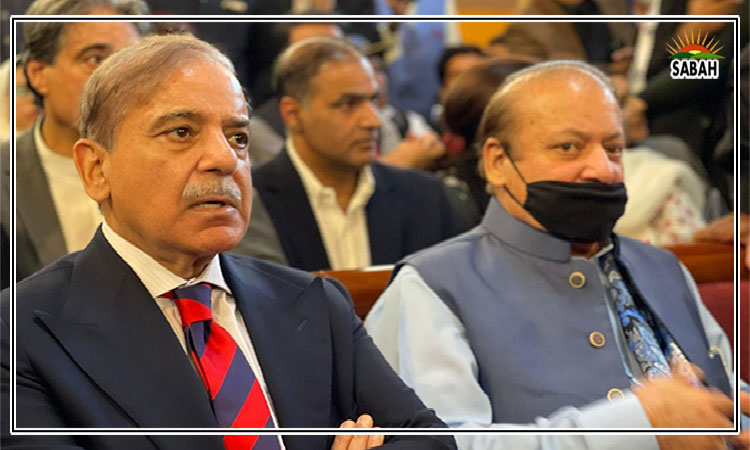Islamabad High Court extends Nawaz Sharif’s protective bail in Avenfield, Al-Azizia references till Oct 26
ISLAMABAD/LAHORE , Oct 24 (SABAH): The Islamabad High Court (IHC) on Tuesday extended Pakistan Muslim League-Nawaz Supremo Mian Muhammad Nawaz Sharif’s protective bail in the Avenfield and Al-Azizia cases — in which he had been convicted — till October 26, after the National Accountability Bureau (NAB) said it had “no objections” to the plea filed by the deposed prime minister.
An IHC division bench, comprising Chief Justice Aamer Farooq and Justice Miangul Hassan Aurangzeb, issued the order on Nawaz’s petitions seeking protective bail in the cases and restoration of his appeals against his conviction.
In July 2018, ousted Nawaz Sharif was handed 10 years in jail in the Avenfield properties corruption reference for owning assets beyond known income and one year for not cooperating with the NAB, which was to be served concurrently.
The Al-Azizia Steel Mills corruption reference pertains to the case in which he was sentenced to seven years in jail on December 24, 2018 and then taken to Rawalpindi’s Adiala Jail, from where he was shifted to Lahore’s Kot Lakhpat jail next day. He was also fined Rs1.5 billion and US$25 million in the case.
Nawaz Sharif was released from jail in March 2019, following which he left for London in November 2019 after the LHC allowed him to do so. The IHC declared him a proclaimed offender in both cases in December 2020.
Last week, the IHC had confirmed Nawaz’s protective bail in the cases till Oct 24, paving the way for his homecoming on Oct 21.
During the proceedings on Tuesday, Nawaz Sharif appeared before the court along with his brother PML-N President and former prime minister Mian Muhammad Shehbaz Sharif and several other party leaders.
At the outset of the hearing, PML-N’s Senator Chaudhry Azam Nazir Tarar Advocate said the accountability court had suspended Nawaz’s warrants in the Toshakhana case and approved his bail against surety bonds.
Here, Justice Farooq said there were two petitions in front of the high court, both of which were related to restoring appeals against Nawaz’s conviction. “We have to issue notices on these applications,” the judge added.
Meanwhile, Justice Aurangzeb said that for the restoration of the appeals, the petitioner had to explain why he remained absent from the court.
At that, Tarar said: “We just want to move as per the law and you are an expert at that.”
However, Justice Farooq maintained that keeping Article 10-A (right to a fair trial) of the Constitution aside, the petitioner had to provide an explanation for his absences from the court.
“You will have to prove that your absences were not deliberate and based on ill intention,” Justice Farooq added.
For his part, Tarar said the Lahore High Court had granted Nawaz permission to leave the country over medical reasons.
“You have made a mistake here,” Justice Farooq pointed out, asking that if matters were pending in one high court, could another high court allow that.
Justice Aurangzeb also questioned the law a court had to follow when petitions had been filed for restoration of appeals.
“This is not a matter of routine, this is a matter of show cause,” the IHC CJ remarked, adding that the court would issue notices to the opposing side. “It is necessary for the court to be satisfied by your reasons,” he said.
At one point, PML-N’s Tarar requested the court to extend Nawaz’s protective bail so that they could prepare for further arguments to which Justice Farooq asked the prosecutor general of NAB to give his opinion on the matter.
In his response, the NAB official said the bureau had read the petition for restoration of appeal and did not have any objections to it. He further said that they had no objections to the extension in the protective bail.
“Is this the same NAB?” Justice Aurangzeb asked here. “I am hearing these cases after five years and am trying to understand if this is the same NAB,” he said.
“Is the NAB saying that charges of corrupt practices should remain, but the convict should be released?” the judge further asked. “Let’s ask the NAB chairman why he is wasting public time.”
Justice Aurangzeb also asked: “If NAB has no objections, why doesn’t it take back the case?” He then asked the bureau’s prosecutor general to take a “definitive position” and instructed him to communicate NAB’s clear position on the matter at the next hearing.
The court subsequently issued notices to the NAB on Nawaz’s pleas for restoration of the appeals against his conviction and bail. It also extended the PML-N supremo’s protective bail till Thursday.
Earlier, talking to reporters, Nawaz was asked if he would participate in the upcoming polls to which the PML-N supremo smiled.
Separately, an Islamabad accountability court judge Muhammad Bashir confirmed the PML-N supremo’s bail in the Toshakhana case.
The accountability court had suspended the perpetual arrest warrants issued in 2020 for Nawaz in the Toshakhana case on October 19.
The case alleges that Nawaz, former president Asif Ali Zardari and ex-prime minister Yousuf Raza Gilani received luxury vehicles and gifts from the Toshakhana — a department that stores gifts given to rulers, parliamentarians, bureaucrats and officials by heads of other governments, states, and foreign dignitaries.
In June 2020, an accountability court had issued non-bailable arrest warrants for the former premier. Months later, Nawaz challenged the warrants in the Islamabad High Court but had withdrawn the petition days later.
On Sept 10, 2020, he was declared a proclaimed offender in the case, with an accountability court initiating the process to confiscate his properties and directing the National Accountability Bureau (NAB) to make his arrest through Interpol.
Islamabad police provided the PML-N supremo with special security as he made his way to court, joining his protocol at the Toll Plaza.
Footage aired on television of Nawaz’s arrival at the accountability court showed his car, which had been showered with rose petals, going through the gate with a large number of PML-N supporters gathered at the back.
PML-N leaders Shehbaz Sharif, Ahsan Iqbal, Khawaja Asif, Ayaz Sadiq and Saad Rafique were also present for the hearing, which was presided over by Judge Muhammad Bashir.
At the outset of the hearing, the court directed to mark Nawaz’s attendance. The hearing, however, was marred by commotion after which the court directed Nawaz to leave the courtroom.
When the hearing resumed, the NAB prosecutor contended that Nawaz had surrendered, therefore, his arrest warrants should be cancelled. “If the warrants are cancelled then the trial can move forward,” he said.
The court subsequently confirmed Nawaz’s bail in the case against surety bonds of Rs1 million. Further, the court accepted an application by Nawaz for Advocate Rana Muhammad Irfan to appear on his behalf as a pleader in court proceedings and excuse the PML-N supremo from hearings due to his health issues.
The court also issued notices to the NAB on Nawaz’s plea against the confiscation of his property and also sought arguments in this regard at the next hearing. Further hearing of the case was adjourned till November 20.
Meanwhile the sentence of Nawaz Sharif, in the Al-Azizia reference has been suspended by the interim Punjab cabinet, it emerged on Tuesday. The decision by the provincial cabinet might raise concerns among other political parties in the country.
Caretaker Information Minister Aamir Mir confirmed the Punjab cabinet’s move, saying the decision was taken while exercising its constitutional powers under Section 401 of the Criminal Procedural Code (CPC), which also authorises it to pardon any offender. The approval was given through a circulation summary.
“The final decision of the case will be taken by the court itself,” he added.
The development comes on the day ahead of Nawaz’s multiple hearings at an accountability court at the Federal Judicial Complex (FJC) and the Islamabad High Court (IHC).
Nawaz Sharif’s sentence was also suspended under the same law on medical grounds before he left for London in 2019 by the then PTI government.
The PML-N supremo had requested for his sentence to be suspended by the Punjab cabinet, Mir said.
It should be noted that Nawaz was sentenced by an accountability court in both the Avenfield and Al-Azizia Steel Mills references.
The sentence was then challenged in the high court, which had suspended the accountability court’s sentence. Appeal proceedings — for the petition challenging the sentence — were underway when the politician travelled to London, United Kingdom, for medical treatment and did not return to pursue the case.
The PML-N supremo — after he moved to Lahore High Court (LHC) instead of the IHC — was allowed to go abroad for four weeks after his brother and party president Shehbaz Sharif submitted an undertaking in the court assuring Nawaz’s return once his health improves.
The IHC — in Nawaz’s absence — threw out the appeals on account of non-prosecution. The court, while declaring him a proclaimed offender, noted that the appeals were rejected on technical grounds and not on the merits of the arguments.
The applicant can once again file an appeal against the sentence upon his return, the court had mentioned in its verdict.
Commenting on the suspension of Nawaz’s sentence by the interim cabinet, Punjab Caretaker Chief Minister Syed Mohsin Raza Naqvi said an application was submitted to Pakistan Tehreek-e-Insaf’s Usman Buzdar-led government back in the day. However, the Buzdar administration rejected it.
The interim chief minister, while speaking with journalists at the Jinnah Hospital in Lahore, said his government has only referred Nawaz to the court.
“Now the court has to decide whether he will be bailed or not,” he said, informing journalists about PTI government’s decision to reject the PML-N supremo’s request in the past.
The caretaker chief minister said the government has sent the request to the court, given similar instances have taken place under Section 401 before as well.












